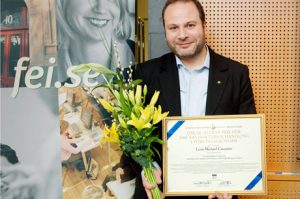
Leon Michael Caesarius avhandling bottnar i frågan om hur ett IT-system skulle kunna utformas för att producera ett vetande om ett område man inte vet någonting om…
Avhandling: In Search Of Known Unknowns – An Empirical Investigation of the Peripety of a Knowledge Management System
Juryns motivering:
“Caesarius avhandling är mycket ambitiös. Den ligger inom området ”knowledge management” och är både grundligt gjord och välskriven. Arbetet utmynnar i påtagliga bidrag, både akademiskt och för praktiken. Avhandlingen behandlar hur IT (informationsteknologin) kan användas för att generera, utveckla och lagra vetande/kompetenser i organisationer. Fokus i studien ligger på att försöka utröna hur IT-system skulle kunna producera ett vetande om ett område som man inledningsvis vet att man inte vet något om (“known unknowns”). I avhandlingen visar han att detta är möjligt om än samtidigt mycket svårt. Det förutsätter bl.a. att organisationen ifråga tillåter ett visst experimenterande.
Avhandlingen är teoretiskt väl förankrad på de två huvudområden som Caesarius försöker att föra samman, dvs. hans förtrogenhet med såväl ”knowledge management” som informationsteknologi imponerar. Till denna teoretiska styrka kommer att arbetet utgörs av en omfattande empirisk, longitudinell studie med en farmaceutisk verksamhet i fokus. Studien handlar om hur man i denna verksamhet försöker utveckla ett “knowledge management”-system och den genomförs på ett mycket djupgående sätt involverande flera analysnivåer och omfattar en längre tidrymd. Det empiriska materialet bidrar tveklöst till vårt vetande om dynamiken i dessa system och deras villkor i organisationer.
Sammanfattningsvis så blir avhandlingens styrka kanske särskilt synlig i det i vetenskapliga sammanhang så avgörande mötet mellan vald teori och inhämtad empiri, dvs. i analysen och slutsatsdragandet. Analysens klarhet, stringens och kreativitet medför att slutsatserna blir starka och trovärdiga och att bidraget till vetandet på det aktuella fältet därför blir högst betydande.”
Sammanfattning:
In their quest to secure their level of competitiveness, organizations have turned their attention to a specific type of information technology (IT) solution referred to as knowledge management systems (KMS). Research recurrently views and defines such system as IT-tools that mainly enable the collection, storing and diffusion of knowledge within the boundaries of the organization. Consequently the focus of KMS is believed to be on intra-organizational ‘knowledge’ re-use of ‘known knowns’. However, despite this definition and despite the inherent claim in the very name of such systems research continues to report failures rather than successes. Yet, the occurrence of the phenomenon of IT–based knowledge management (KM) endeavours in organizations continuous to rise. What really is the nature of this phenomenon and what is it a manifestation of?The purpose of this investigation is to explore the nature of IT–based knowledge management endeavours and their outcomes, and to explicate thereby the intricacies that surround them. How can KMS be described? How are they developed? Why are they deployed and what, if any, are the outcomes for the organization using them are the four research questions driving the investigation. Furthermore, it the investigation rests on a theoretical framework influenced by a constructionist perspective on knowledge and builds empirically on a longitudinal case study of a large international pharmaceutical firm’s IT-based KM effort.The empirical findings suggest that the case organization bridged the boundaries with the outside world by using the KMS as a way to establish knowledge exchange relationships with key target audiences.
Getting the audiences to use the system meant transforming them to de facto information producers. To enable the continuity in the use of the system, the case organization designed it to provide the audiences continuous knowledge intensive services in return for getting informated. The services centred on supporting the practices of the target audiences by drawing on the automating and informating ability of IT. Granted an interimistic at least continuity in the use of the system by the target audiences meant a possibility for knowledge creation through experimentation for the organization and a possibility for knowledge creation through the enactment of embodied practice for the target audiences. A number of intricacies however, limited as expected the lifespan of the system.The main conclusion drawn from the case study is that the phenomenon has become inter-organizational and instead of simply focusing on knowledge re-use it also focuses, and in the specific case predominantly so, on knowledge creation. This is an indication that the phenomenon can be understood as a manifestation of an attempt to search for ‘known unknowns’ by means of IT. This in turn suggests an expansion from only exploitative to both exploitative and explorative use of IT; an expansion from using IT not only for efficiency-enhancing purposes but for effectiveness-enhancing purposes as well…